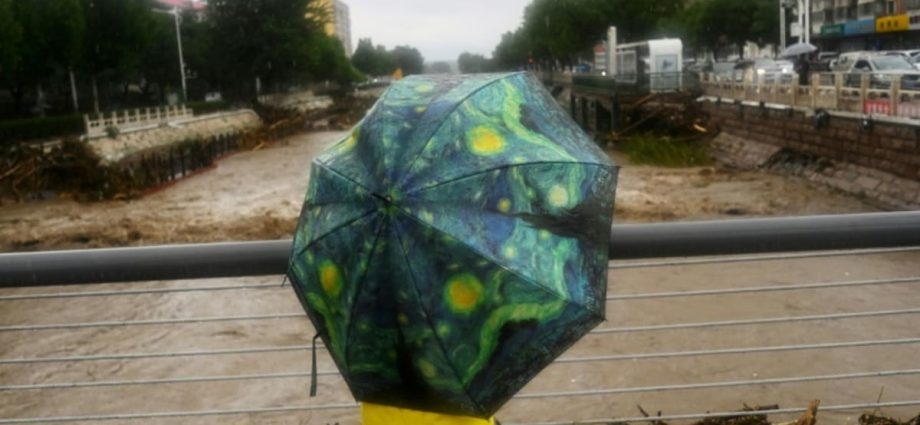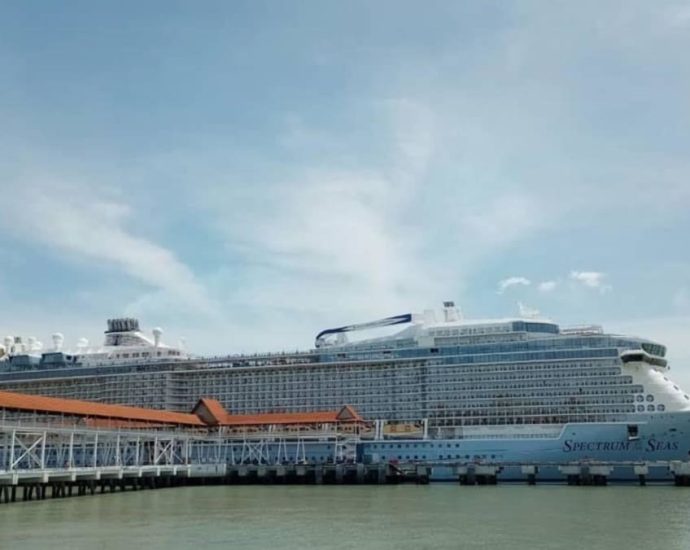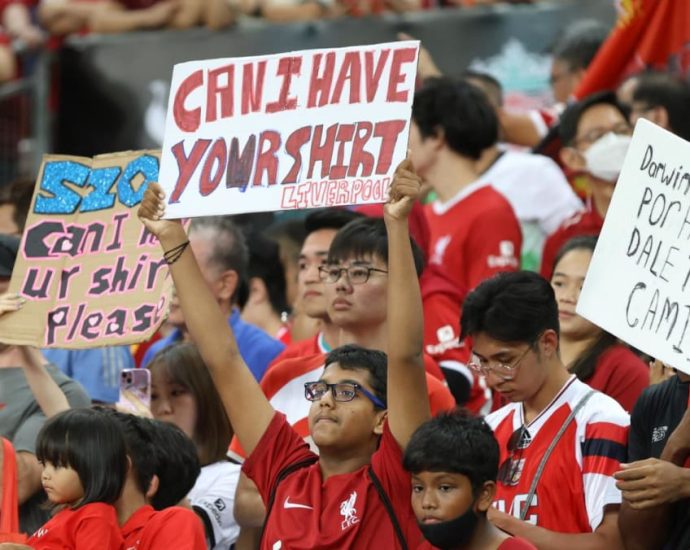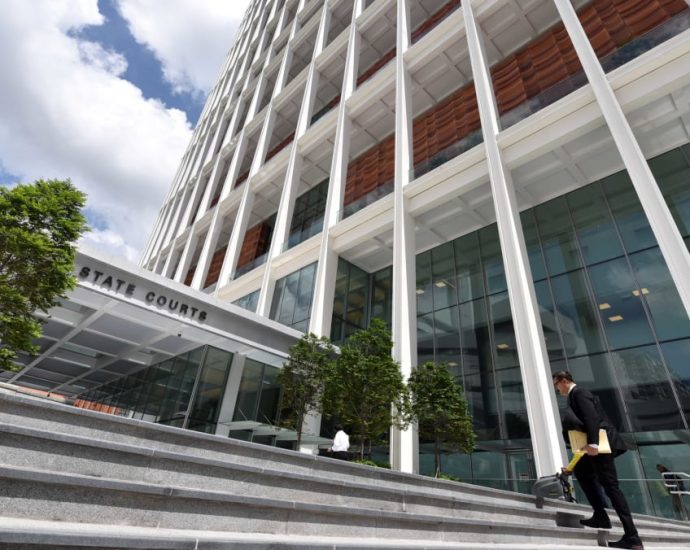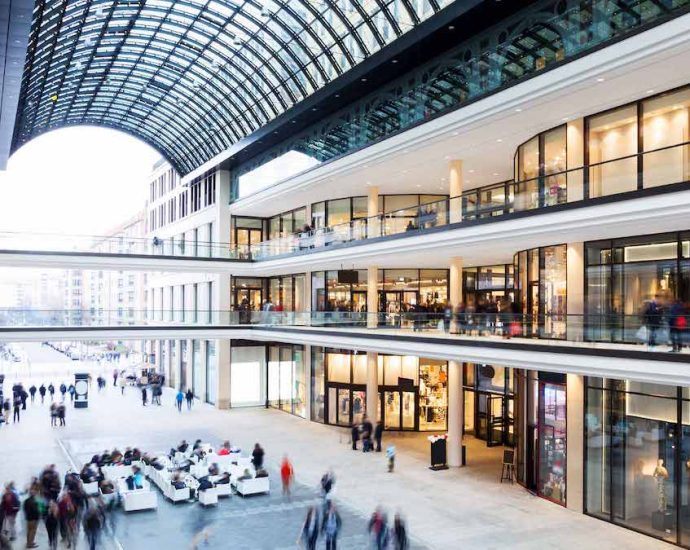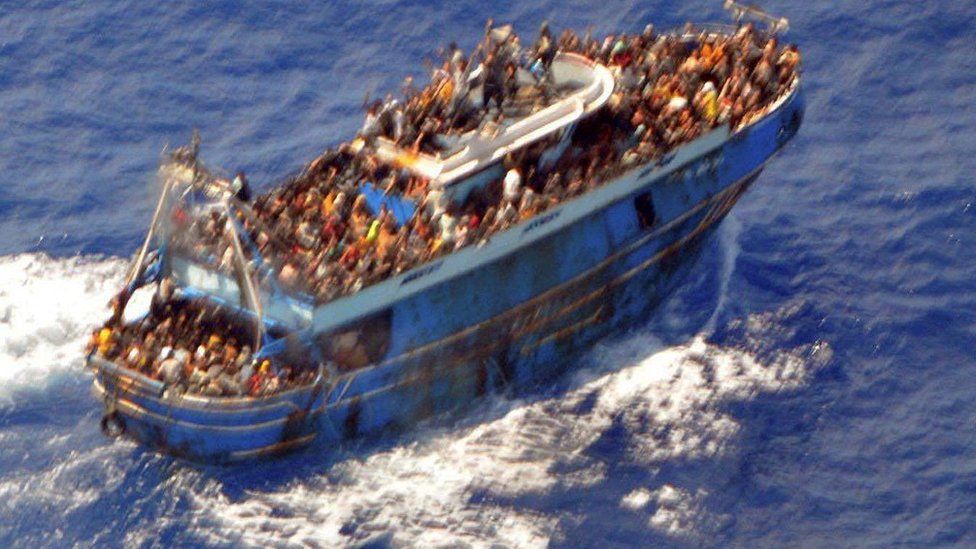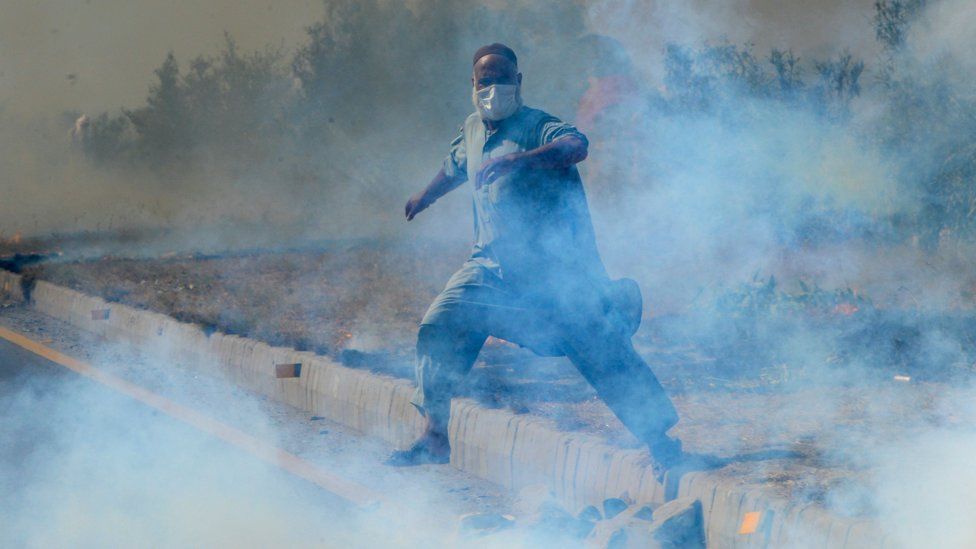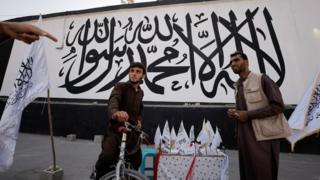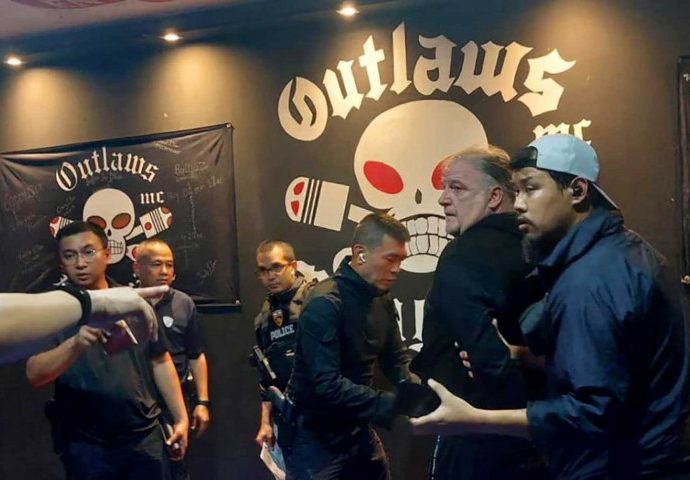Military helicopters deliver aid to Beijing flood victims
BEIJING: China deployed military helicopters on Tuesday (Aug 1) to deliver supplies to stranded train passengers in Beijing, state media reported, after deadly rainstorms wreaked havoc in the Chinese capital. Storm Doksuri, a former super typhoon, has swept northwards over China since Friday, when it hit southern Fujian province afterContinue Reading
‘I had no idea’: Spectrum of the Seas passengers in the dark after person falls overboard cruise ship
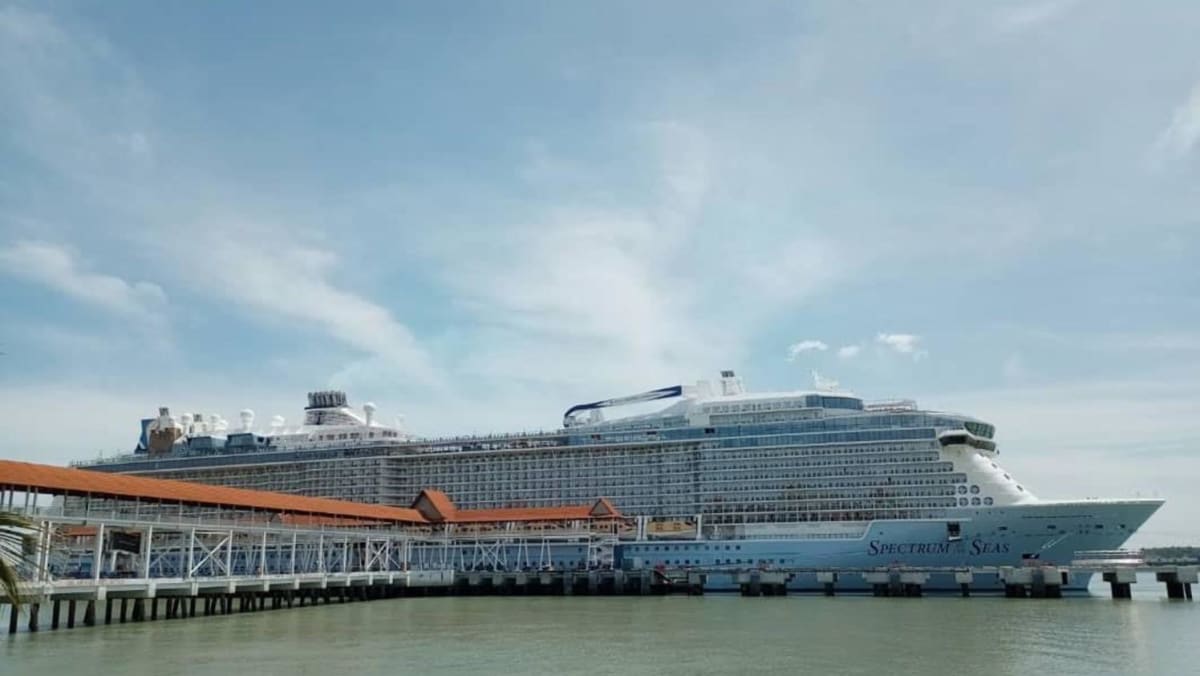
SINGAPORE: Passengers on Royal Caribbean cruise ship Spectrum of the Seas said that they were unaware someone had fallen overboard until news broke online.
Several passengers told CNA that there were a few announcements paging for a woman to report to guest services sometime between 5.30am and 6.30am on Monday (Jul 31) morning.
Mr Pedro Adrian Aguirre was awake and sitting at his room’s balcony when he heard the first announcement.
“I thought since (it was the) last day maybe she had an outstanding debt,” he said.
Another passenger who only wanted to be known as Ms M Ori, said that there were a few announcements “in the cabins and all over the ship” at about 6am.
These announcements were made within the span of about 30 minutes, she estimated.
“As we have cruised over 50 times we knew something was not right,” said Ms Ori.
Another passenger CNA contacted said he did not hear the announcements as he was asleep.
SEARCH AND RESCUE
The Maritime and Port Authority of Singapore (MPA) said on Monday that a passenger had fallen overboard.
In its last update on Monday night, MPA said that search efforts coordinated by the Maritime Rescue Coordination Centre (MRCC) were underway.
The MRCC was notified of the incident at about 7.50am while the vessel was en route to Singapore.
Royal Caribbean added that the ship’s crew immediately launched search and rescue when it was found that the person had fallen overboard.
A care team is currently offering assistance and support to the family of the missing passenger, the company said.
“I would like to think that the cruise line did the correct procedure in order to make it possible to find the person,” said Ms Ori, who found out about the incident via a post on Facebook.
She added that passengers were not told of the incident.
“After the announcement in the cabins there was nothing else. Nothing seemed to be (out) of the ordinary and we just went to have breakfast,” she said.
“I had no idea and we were chatting to a big group of 20 people before we left … and no one even mentioned a word of it, we were not aware of it. And definitely not told.”
Disembarkation was as per scheduled on Monday morning, added Mr Aguirre.
Spectrum of the Seas then left Singapore at 4.30pm, MPA said in a subsequent update at 11pm. Its initial statement, sent shortly after 9pm, said the ship was “currently berthed in Singapore” and “supporting with investigations”.
Royal Caribbean International said at 10.30pm on the same day that Spectrum of the Seas had been “cleared by authorities” and sailed as scheduled.
An itinerary on the Royal Caribbean website indicates a 12-night voyage to Tokyo, with stops in Vietnam and Hong Kong, starting on Jul 31.
CNA has contacted Royal Caribbean and MPA for further updates on the missing passenger.
Sell-out crowd expected at National Stadium for match between Liverpool and Bayern Munich
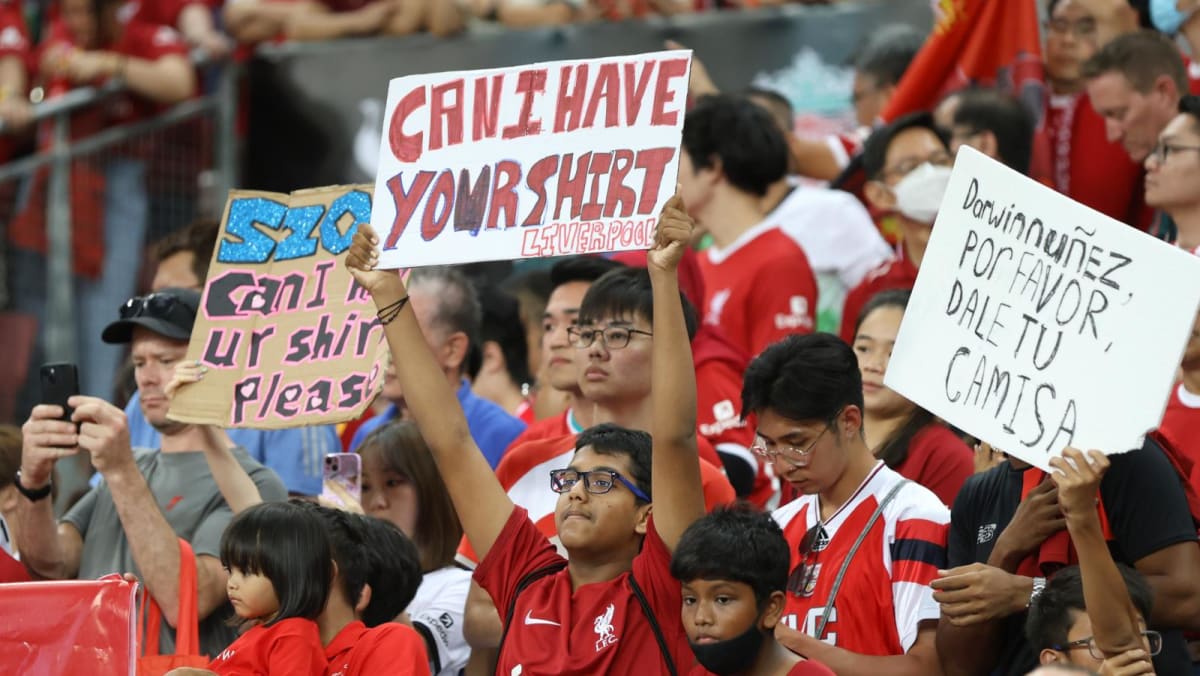
FANS EXCITED TO SEE THEIR FAVOURITES
The fans, some of whom have been supporting the teams for decades, are grateful.
“They rarely come to Asia. I am just happy that they come in successive years,” said one fan who managed to get a banner signed.
Some fans even went the extra mile and camped overnight to get limited spots inside the hotel for a close encounter with the players.
Organisers said about a third of spectators have travelled to Singapore from overseas.
They include one traveller from Taiwan who was here with her seven-year-old son.
“Singapore is very close, it is very easy to get here. So we can bring our kids, fly here and see this international game,” she told CNA.
Mr Oh said that fans from neighbouring countries like Malaysia, Thailand and Indonesia are also expected to attend the games.
But it is not just the fans who are cheering.
BOOMING BUSINESS
Some sports retailers have seen business improve on the back of the festival.
Premier Football’s general manager Chua Wee Lee said sales picked up in the last week, with Bayern Munich, Liverpool and Tottenham Hotspur fans buying jerseys and customising them.
When the teams come to Singapore, there is typically between a 25 and 50 per jump in sales, he said, adding that the size of the increase depends on which teams are involved.
“It does create that buzz. Not just in terms of business and sales, but also in terms of people coming and talking, all these conversations surrounding football,” he said.
With Singapore hosting top European clubs on their pre-season tours two years in a row, fans may now be expecting a hat-trick next year.
Mediacorp brings you pre-season football action from 15 July to 6 August as some of the biggest clubs take to the field in friendlies across Asia, Australia, Europe and the USA. Catch all these pre-season matches for free, live or on-demand on mewatch! Highlights will also be available on mewatch and Mediacorp’s Entertainment YouTube Channel.
Woman charged with splashing hot water on her 4 children aged 8 to 11
SINGAPORE: A woman is accused of ill-treating four of her children by splashing hot water on them, leaving scald burns on their bodies. The 33-year-old woman, who cannot be named due to gag orders protecting the children’s identities, was handed four charges on Tuesday (Aug 1) of ill-treating children inContinue Reading
China boosts consumption as services activity slows

China on Monday announced 20 new measures to stimulate its domestic consumption as the growth of activities in the services and construction sectors slowed in July.
The supportive measures include the removal of car ownership limits, the acceleration of urban renewal projects in large cities and the launch of various campaigns that will encourage people to travel, dine and shop, according to the National Development and Reform Commission.
The State Council said all government departments and local governments should help push forward these 20 measures but it did not announce any fiscal support for them.
The stimuli were launched after the National Bureau of Statistics said Monday that China’s official non-manufacturing purchasing managers’ index (PMI) fell from 53.2 in June to 51.5 in July, the lowest level since last December.
A reading above 50 indicates expansion while one below that level refers to contraction.
Development and Reform Commission Vice Chairman Li Chunlin said Monday that although the catering, tourism and cinema sectors had recovered in the first half, some consumers were still reluctant to buy goods.
Li said people avoided spending as they had bad user experiences, which can be improved by policies. Besides, he said local governments should ensure that factory workers can fully enjoy their paid annual leaves so they can spend money and help support the tourism sector.
China passed its Labor Law in 1994 to make sure that workers can have 10 days of annual leave but 72% of workers could not fully use their annual leave allocations for various reasons, said the Legal Daily, a newspaper of the Chinese Communist Party.
On average, workers in the private sector end up taking not even four full days of annual leave per year, it said, citing the data of the Ministry of Human Resources and Social Security.
Some economists said China’s non-manufacturing PMI may return to contraction in the coming few months as previously-launched supportive measures will only show their effects later this year.
The non-manufacturing sector showed a larger-than-expected slowdown in growth and further falls could see it skirting with contraction,” Robert Carnell, regional head of research, Asia-Pacific, ING, writes in a research report.
“Looking at the breakdown of the non-manufacturing sector, what strikes you is that most of the sub-components are already showing contraction,” he says. “The one component that stands out from the rest is expectations, which looks like an unrealistic outlier compared with what is going on elsewhere.”
“While we believe that a great many micro measures will be implemented to improve the functioning of the economy, including a reduction in constraints on the private sector, we aren’t at all convinced that there is a fiscal bazooka waiting to fire up the economy,” he adds.
‘Full-time sons and daughters’
Meanwhile, the manufacturing PMI, an indicator of factory activities, slightly rebounded from 49 in June to 49.3 in July, the statistics bureau said. The latest figure showed contraction for a fourth consecutive month as demands from the United States and Europe remained weak. The overall PMI fell from 52.3 in June to 51.1 in July.
An index tracking new orders, a sub-component of China’s manufacturing PMI, came at 49.5 in July, compared with 48.6 in June. It has been in contraction since April.
“Although the manufacturing PMI rebounded to 49.3 in July, some companies said the current external environment is complicated and severe as overseas orders have decreased, and insufficient demand is still the main difficulty facing enterprises,” Zhao Qinghe, a senior official at the NBS, said in a statement on Monday.
Zhao said the manufacturing sectors in the West are also contracting as PMIs in the US and eurozone were 49 and 42.7, respectively, in July.
Wu Chaoming, deputy director of the Chasing International Economic Institute, said the growth of China’s manufacturing sector has been slowed by a decline in external demands in recent months. Wu said that in the second half of this year boosting domestic demands will be the government’s top economic mission as it can help support the manufacturing sector.
A Sichuan-based financial columnist writes in a recent article that the Chinese economy is now facing challenges in four areas. They include an ultra-high youth employment rate, a sharp decrease in foreign orders, a sluggish property market and weak consumer confidence. He says the central government should unveil more monetary and fiscal measures to stimulate the economy and create jobs.
Some economists said the contraction in factory activities will worsen China’s job market situation.
The statistics bureau said on July 17 that the unemployment rate of people aged 16-24 recorded a high at 21.3% in June from 20.8% in May. Officials there said the figure will further increase in July but hopefully start to ease when fresh graduates receive their job offers after August.
Zhang Dandan, an associate professor at Peking University’s National School of Development, said society must pay attention to the abnormally high employment rate among the young people in China as that problem can result in social instability.
She said the youth jobless rate is 14.3% in the European Union, 11.3% in the United Kingdom, 6.5% in both the US and South Korea and 5% in Japan.
She said about 16 million young people in China have lost motivation to find jobs and chosen to be paid by their parents to become so-called full-time sons and daughters. She said if they are included in the jobless population, the country’s youth unemployment rate should be around 46.5%.
Read: China to boost consumption, private investments
Follow Jeff Pao on Twitter at @jeffpao3
Why Pakistanis are taking the dangerous Libya route to Europe
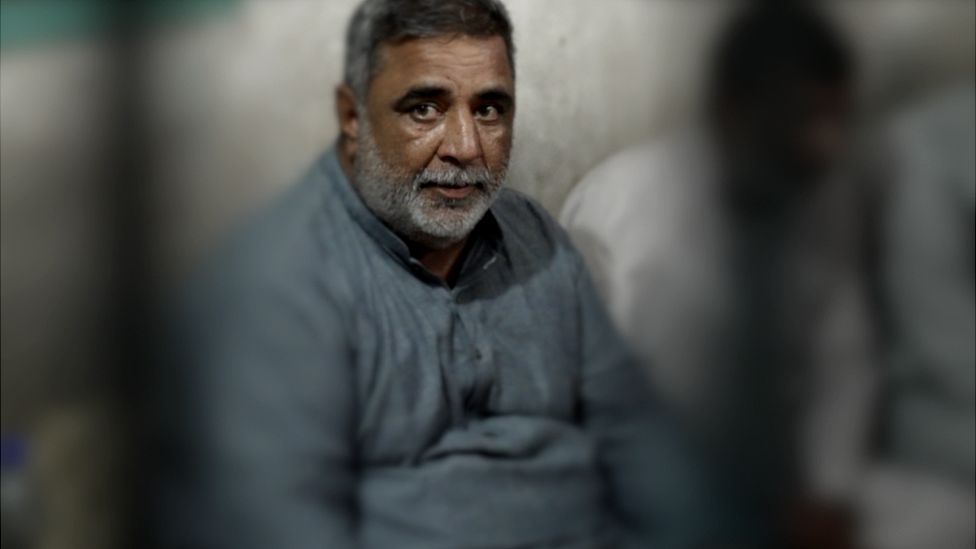
Thousands of Pakistanis are taking the Libya route to seek work in Europe. It involves a boat journey, the perils of which were highlighted when an overcrowded vessel sank off Greece in June with huge loss of life. Of nearly 13,000 Pakistanis who headed for Libya and Egypt this year, most haven’t returned – including two teenagers whose last words to their mother were not to worry.
At the police station in Punjab province it is 35C (95F), humid and still. Sweat runs down our backs; the officer’s temple shines with it.
Down a short open corridor, past rooms filled with precariously balanced papers, we are shown a small cell. Sixteen men sit side by side on the cement floor, damp is seeping through the walls, a single fan whirs behind the cell bars, and there is one toilet behind a low wall.
All these men are alleged to have been involved in human smuggling, the majority directly in connection with the migrant ship that left Libya and sank off Greece on 14 June. Nearly 300 Pakistanis thought to have been on board are missing, feared dead.
We ask if anyone wants to speak. Most avert their eyes, but one man, Husnain Shah, jumps up. This is his third arrest; he has been a smuggler for more than a decade, he says, although he denies he played a large role in the shipwreck off the coast of Greece.
“There is so much unemployment here people show up to our houses and ask us to put them in touch with someone who can take their brothers and sons abroad,” he says. He believes he has taken thousands of people in his years operating.
“I started this because there was no other business. I don’t have a main role, it’s the people who are sitting in Libya who are very big and rich; we don’t even get the main share, not even a tenth of the amount.”
When I ask if he feels a sense of guilt at what has happened to those who have died taking these routes, his tone changes.
“I felt very sorry, we are really ashamed over this. But what can we do? If I don’t do this, someone else will do it.”
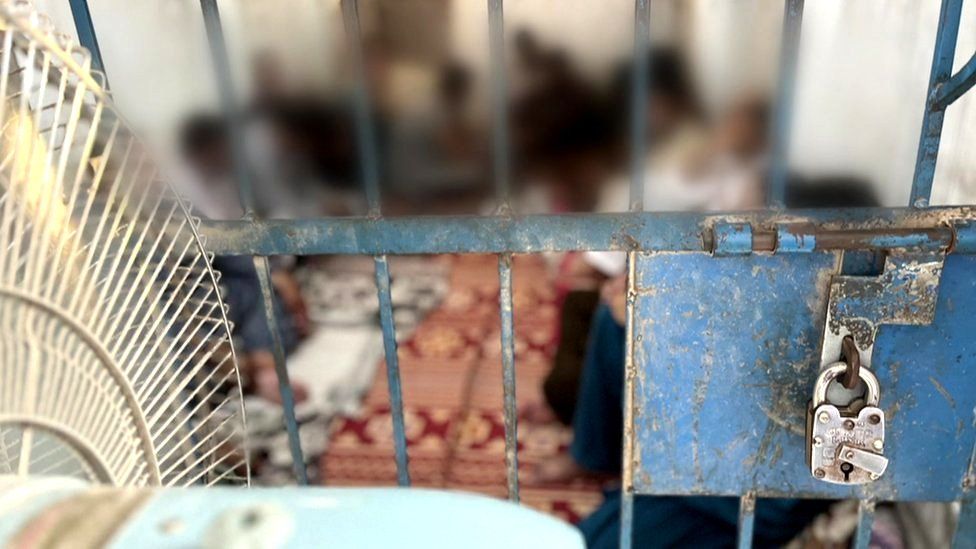
With the economy teetering on the edge, inflation reaching nearly 40% and the Pakistani rupee dropping in value, many here are looking to go abroad, where even a low salary will likely exceed anything they can earn if they stay.
A survey at the end of last year found that 62% of boys and young men aged 15-24 wanted to leave. While some will try to go legally, others will find alternative routes.
By its nature, illegal migration is difficult to quantify, but the Pakistani authorities told us that the recent Greek shipwreck did highlight a newly popular route for Pakistanis; flying via Dubai to Egypt or Libya, then taking a large boat from eastern Libya across to Europe.
Pakistan now has fewer deportees from other routes, such as across Iran, as fewer people are taking the journeys after countries like Turkey cracked down on illegal arrivals, says Mohammed Alam Shinwari, who is in charge of Pakistan’s investigation into what happened with the Greek shipwreck.
He told the BBC nearly 13,000 people left Pakistan to go to Libya or Egypt in the first six months of 2023, compared with around 7,000 in the whole of 2022. Of those 13,000, 10,000 have not returned.
“We don’t know whether they are still in Libya or if they have gone to any of the European countries.”
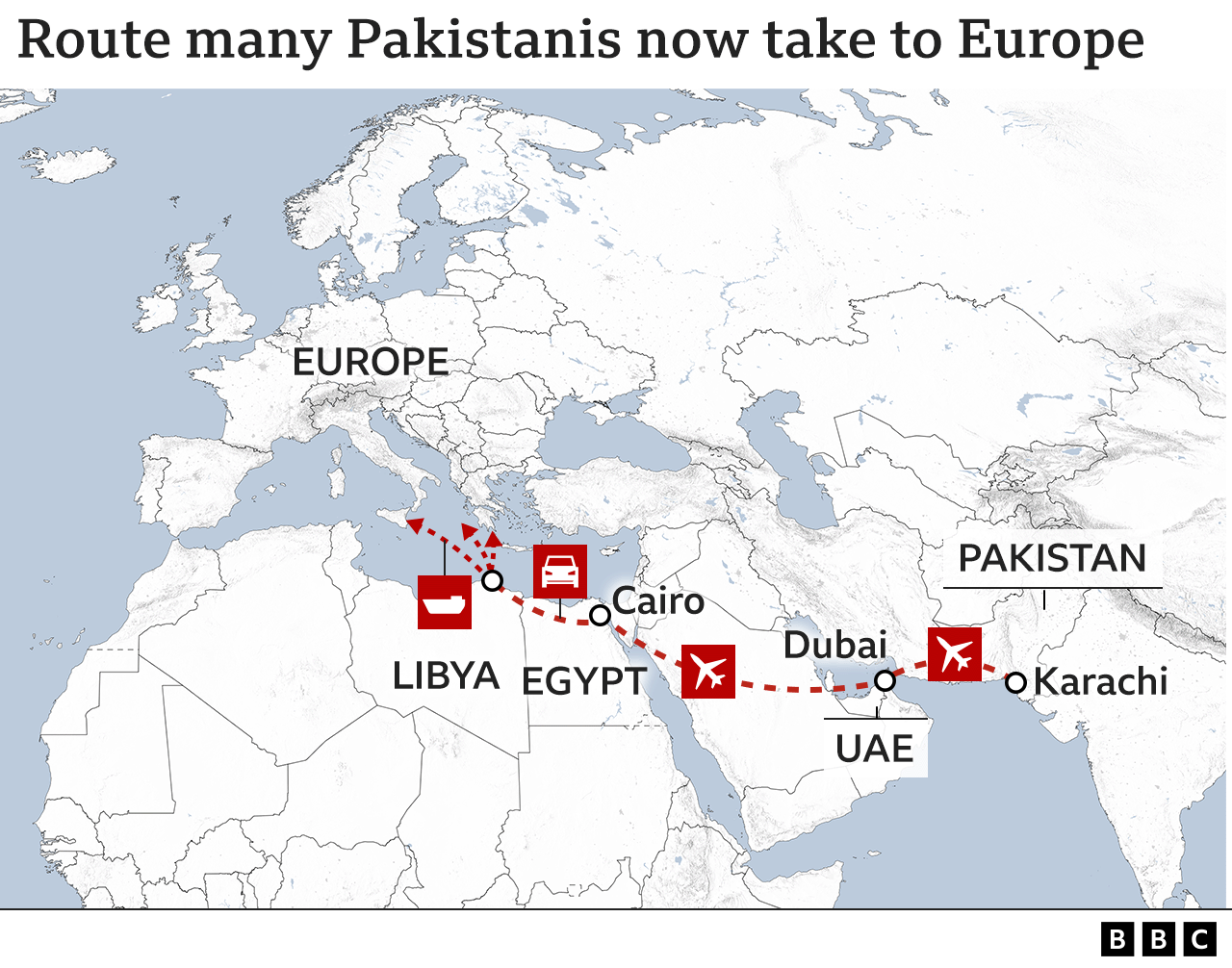
It seems surprising it has taken the police until the shipwreck to realise how many Pakistanis were taking this route. In February, Pakistanis were on board a ship which sank off the coast of Italy having travelled from Turkey via Libya.
But Mr Shinwari argues that investigating these routes is complicated when families do not come to the police about what has happened.
“People don’t come forward to complain, instead they will go to out of court settlements,” he says. “It becomes very difficult for us to pursue those cases and gather information because that has to come from the families and in most cases they won’t tell us.”
There are added complications too; many of these travellers he says flew on valid documents with valid visas for Dubai or Egypt, making it hard to stop them. This also means that the journey is more expensive than previous routes – between 2.5-3m rupees (£6,780-8,140; $8,725-10,470) showing the amounts many are willing to pay to get out.
Pakistan does work to stop illegal migration; Mr Shinwari tells me that they stopped 19,000 people from going abroad last year as they feared they could be victims of people smuggling, and they had 20,000 Pakistanis deported back.
“As to how many people are going,” he says. “We don’t have any idea.”
Some of those who have made this journey are now stranded in Libya. In one village in Punjab, we stop to speak to one family, but are quickly joined by men from across the area.
Several of their young men travelled out to Libya weeks before and are still there. They send their relatives and friends voice notes and videos, begging for more money.
One father shows us a video of more than 100 men in a windowless room with white walls and white floors. Most of the men are stripped down to their underwear to withstand the heat, several are pleading to the camera to get them out.

The situation is so confused, their families don’t know if they are being still held by smugglers, by Libyan authorities or by someone else. They asked us not to reveal their identities in case there is retaliation against the men still held.
“They only give them food once every two to three days,” one father tells me. “My son cries a lot, he is only 18 years old. He says what kind of trouble have we landed into, we gave the money and we are dying here.”
Even given these conditions, the families aren’t consistent about what they want to happen next. Initially when asked, they said they wanted a safe way for the young men to continue to Europe, but then later said they wanted them to return home.
Pakistan’s foreign affairs ministry is aware and is working on this, police say.
Despite the risks and the police crackdown, we spoke to numerous people across Pakistan who said they were actively still looking to travel illegally.
One smuggler, based in Europe, said routes were still operating out of Pakistan. Even the police authorities acknowledged that they know people are still leaving the country illegally.
Of the many people we spoke to who either wanted to go or had willingly sent their sons, all spoke of hope for a better life.
Some talked about social pressure; one man said most of his cousins and brothers had already made the crossing, and that now at social occasions he was pushed to explain why he hadn’t gone.
Others talked about seeing the homes built with money earned abroad, of pressure put on them by the smugglers who lived near them to do what would be best for their children’s future.
Some even had personal experience of making the journey themselves.
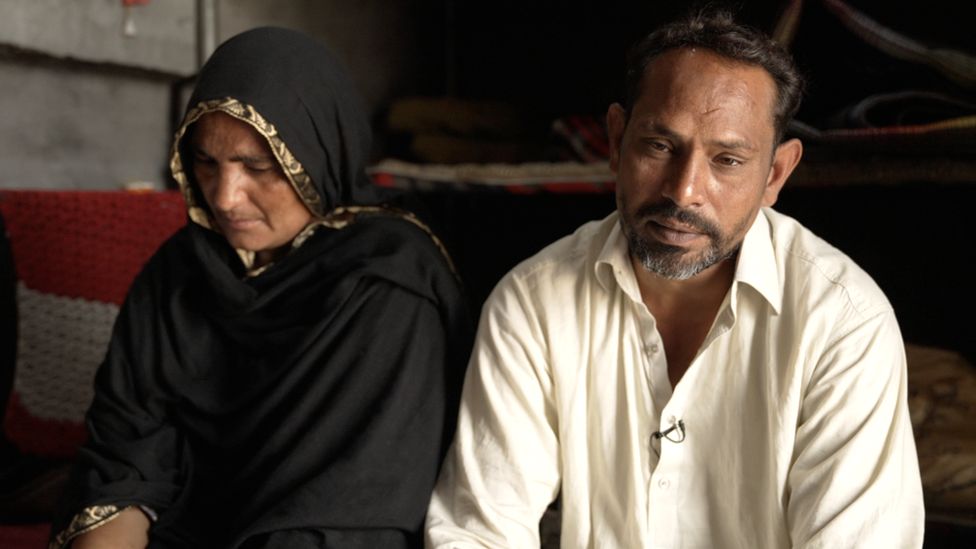
Fareed Hussain went to Germany illegally eight years ago, travelling through Turkey via Greece, Macedonia, Serbia, Croatia and Slovenia. After four years he returned when his father became ill and he needed to take care of the family. Then he was persuaded by the same smuggler to send his teenage sons.
“He used to make us believe that Europe was just in front of us,” Fareed says. “That the kids are going to go and make a life for themselves and then you can buy whatever you want.
“I thought we are poor people, even if they get educated here they won’t find a job and we don’t have much land. I thought they will go, get educated and work.”
Fareed sold his family plot and then his two boys, Farhad and Touheed, travelled to Libya via Egypt and Dubai. Their parents have videos of them excitedly boarding the plane; of the safe house in Libya, sleeping on the floor with dozens of other boys and young men; and a voice note sent at 04:00 on the morning they left, telling their mother not to worry.
A few days later, the smugglers contacted the family telling them to distribute sweets, that their children had made it. They began celebrating.
The following day, their cousins called. They had read an international news article about a migrant ship sinking. By then the smugglers had left.
The family never heard from the boys again. Both are believed to have drowned in Greece’s waters on 14 June. They were 18 and 15 years old. Their parents may never have their bodies to bury.
Now their mother says she listens to their voice messages and cries for hours.
“Even if there is poverty here and they die from hunger, you shouldn’t go,” says Fareed. ” It doesn’t matter how much anyone convinces you.”
Related Topics
US presses Taliban on human rights at Doha talks
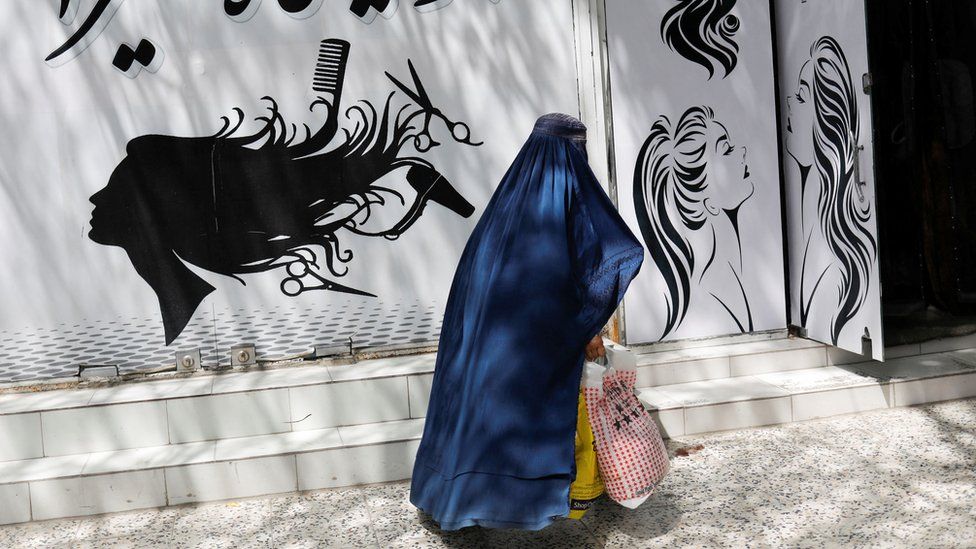 Reuters
ReutersThe US has urged Afghanistan’s ruling Taliban to “reverse policies responsible for the deteriorating human rights situation” in the country, particularly for women, girls, and “vulnerable communities”.
It also pressed for the release of detained US citizens during talks with Taliban representatives in Qatar.
The Taliban said they wanted travel restrictions lifted for their leaders.
The Islamist hardliners swept back to power in Afghanistan in August 2021.
This followed the chaotic withdrawal of US troops from the country after years of war.
The US Department of State said talks with “senior Taliban representatives and technocratic professionals” had been held over Sunday and Monday in Doha.
The US delegation “expressed support for the Afghan people’s demands for their rights to be respected and for their voices to shape the future of the country”.
The US wants the Taliban to reverse bans on secondary education for girls and employment for women.
At the same time, the US delegation “took note” of the Taliban’s “continuing commitment not to allow Afghanistan to be used as a platform for attacks on the United States and its allies”, acknowledging a “decrease in large-scale terrorist attacks against Afghan civilians”.
For their part, the Taliban said they wanted the unfreezing of Afghanistan’s assets.
The US froze $10bn (£7.8bn) of the country’s central bank assets in 2021.
For two decades, the Taliban were America’s sworn enemies.
They were ousted by the US after the 9/11 attacks but their insurgence continued to target America’s troops and their allies.
It took just days for Taliban fighters to regain Kabul as the last US troops withdrew two years ago.
No country recognises the Taliban administration but they are the de facto government.

You may also be interested in:
This video can not be played
To play this video you need to enable JavaScript in your browser.
Related Topics
-
-
12 August 2022
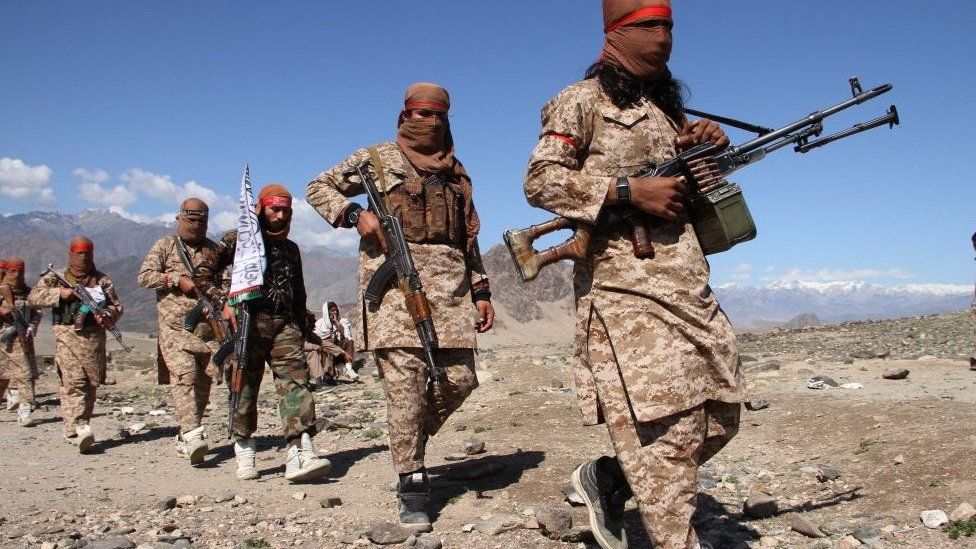
-
-
-
9 October 2021
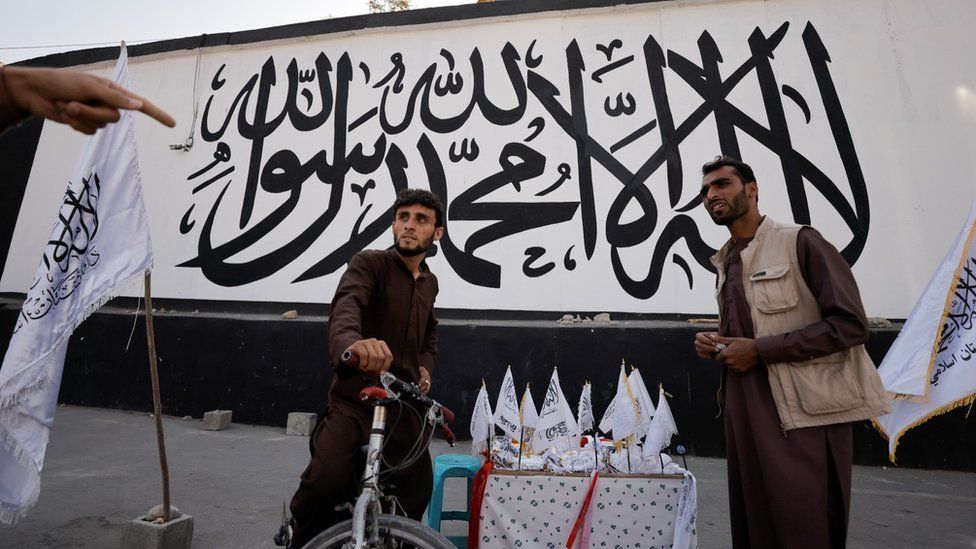
-
-
-
9 October 2021
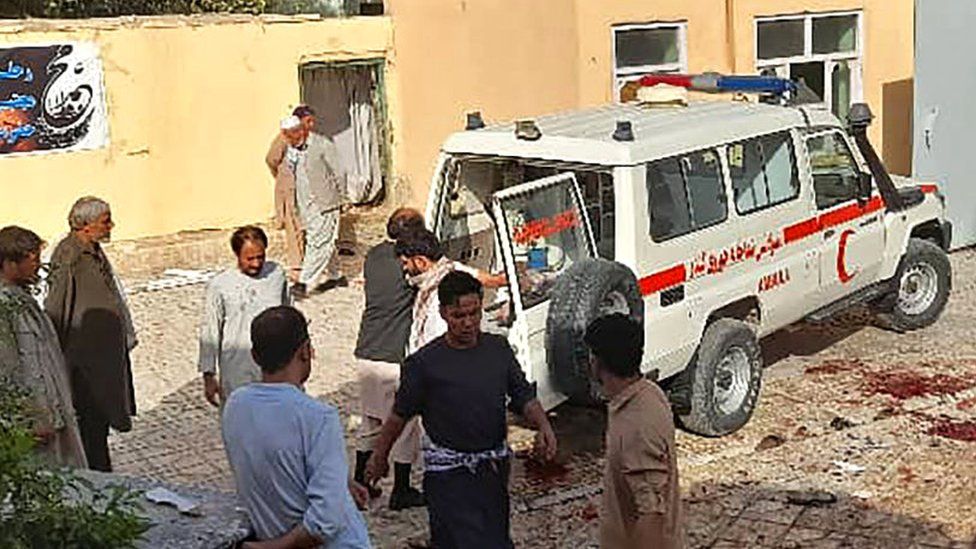
-
-
-
11 October 2021
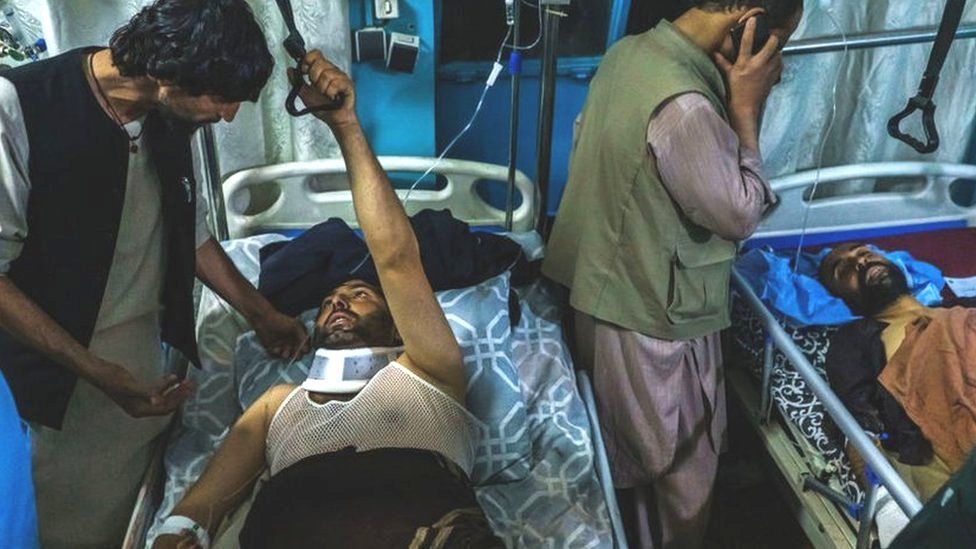
-
Drop Thaksin focus, Pheu Thai warned
PUBLISHED : 1 Aug 2023 at 07:02

The Pheu Thai Party should focus on mustering enough support for its bid to form a new government rather than bringing former prime minister Thaksin Shinawatra back home, said Assoc Prof Phichai Ratanatilaka Na Bhuket, an academic with the National Institute of Development Administration (Nida).
Drumming up as much support as possible for Srettha Thavisin, who is expected to be nominated for a new prime ministerial vote on Friday, should be Pheu Thai’s priority, Assoc Prof Phichai said.
However, if Pheu Thai’s candidate can’t secure enough votes, the party should return the right to lead the bloc to the Move Forward Party (MFP), he said.
The so-called old powers — political parties in the caretaker government and their allies — are pressuring Pheu Thai into ditching the MFP after earlier seeming reluctant to engage in talks with parties outside their alliance, he said.
The change of tack follows a statement made by Paetongtarn Shinawatra, Thaksin’s daughter, that her father planned to return to Thailand on Aug 10, said Assoc Prof Phichai.
Rumours have also swirled that Pheu Thai and its red-shirt supporters have united with their opponents, yellow-shirt supporters of the caretaker government, in a new deal reached to prevent the MFP from succeeding in taking office after the party won the May 14 election with the highest number of House seats, said Assoc Prof Phichai.
A secret deal reportedly reached as part of the bid to help Thaksin return to Thailand has abruptly been aborted, dashing the hopes of those who expected to see Thaksin return as he had vowed to, Assoc Prof Phichai said.
Jatuporn Prompan, former chairman of the red-shirt United Front for Democracy against Dictatorship (UDD), said he did not believe Thaksin would return on Aug 10 because if he did, he would be put in jail instead of enjoying the privilege of winning a royal pardon on the day he arrives.
Mr Jatuporn said the instant pardon hope — where Thaksin is allowed to go home — was “highly unlikely” to become a reality.
“If he doesn’t show up at 10.30am on Aug 10 as claimed, let me find another excuse for him. Maybe he is sick this time,” said Mr Jatuporn.
Driving out the gangs

The Royal Thai Police (RTP) will now look into five major biker gangs based in the country after arresting the leader, an Austrian national, and some members of the Outlaws Motorcycle Club in Pattaya on July 21.
The arrest of gang leader “Mr Thomas” follows an incident in which a gang member, Olaf Thorsten Brinkmann, was involved in the murder of Hans Peter Walter Mack, 62, a German property broker in Nong Prue district, Chon Buri, in June.
For the murder case, police also arrested three other suspects: Petra Christl Grundgreif, 54, Nicole Frevel, 52, and Shahrukh Karim Uddin, 27.
Pol Gen Surachate Hakparn, deputy national police chief, told the Bangkok Post that police are still working to eradicate crimes conducted by foreigners living on Thai soil.
“Five major gangs are on our radar,” he said, adding they are the Outlaws Motorcycle Club or Outlaws MC, Hells Angels Motorcycle Club or Hells Angels, the Bandidos Motorcycle Club, which is also known as the Bandido Nation, the Mongols Motorcycle Club or the Mongol Brotherhood, and the Vagos Motorcycle Club, which is also known as the Green Nation.
The Outlaws also have their networks in Phuket and Koh Samui in Surat Thani, he said, adding the other gangs live in other parts of the country, mainly tourist destinations.
The gang members tend to ride big bikes like Harley-Davidson motorcycles, have tattoos and are involved in narcotic drug distribution and other criminal activities, including assault, extortion, theft, loan-sharking, fraud, money laundering, attempted murder or murder.
Most of the gangs in Thailand are run by Australian nationals, he said, adding they are international outlaw motorcycle clubs that have members in many countries around the world.
Some members come to Thailand and live in places that attract foreign tourists, such as Phuket, Pattaya and Koh Samui.
Their targets are foreigners. They demand protection fees from foreigners who want to run businesses in cities where the gang exists or even abduct them for money.
“They do not harm Thais because they know they will get into trouble easier than doing it to foreigners who will soon fly back to their home countries,” he said.
Amending the law
Pol Gen Surachate said the lack of strict law enforcement and corrupt officials are other reasons the gang members chose to base themselves in Thailand.
He cited the Immigration Act as an example. He said the 1979 law is outdated and needs to be amended.
For example, requirements for obtaining a retirement visa are easy, he said, adding the law requires any foreigner aged at least 50 years old to have at least 800,000 baht in their bank account or an income certificate with a monthly salary not less than 65,000 baht. That requirement is too low and does not help screen quality applicants.
A lack of inspection of bank statements by Immigration Bureau (IB) officers also leaves room for some foreigners to window-dress their bank accounts.
Some even get help from visa agencies or IB officers, such as the case in which 107 immigration officers helped more than 3,000 Chinese nationals involved in “grey” businesses obtain visas in February, he said.
Stronger visa criteria could help prevent gang members or those on international criminal blacklists from entering the country.
“When mafia gangs still exist, foreigners do not feel safe. They may not want to travel to Pattaya or invest in the Eastern Seaboard. This causes huge damage to the country,” he added.
Building up confidence
Pol Gen Surachate said police need to build trust among locals and foreigners. They need to enforce laws and ensure safety for international visitors.
“We will eradicate bad guys not only among gangs but also among police officials and agencies involved with foreigners. We need to make our foreign visitors feel safe when they come to Thailand,” he said.
He cited an incident where a 22-year-old Chinese student was kidnapped for a ransom of 500,000 yuan (2.3 million baht) from her family living in China as another example.
The student was found tortured and murdered, with her corpse dumped in a ditch in Nonthaburi in April. The kidnappers were arrested in China.
News of the incident spread like wildfire, scaring many Chinese visitors who decided not to come to the kingdom.
Another incident was in March when police arrested three Chinese nationals for abducting a compatriot in Bangkok and extorting about 3.2 million baht from her.
He said the Chinese embassy also posted warning messages to its citizens about scams and frauds to prevent them from falling victim. The incidents show that Chinese visitors are concerned about their safety in Thailand.
“If we cannot suppress crimes happening to foreigners, it is not only the Chinese visitors who will not come, visitors from other countries like those in Europe will also avoid the place,” he said.
Once a new government is in place, he will propose through the police chief that the new cabinet amend the immigration law, especially for visa extensions.
“We will make the law tough to screen out bad people, but the law will also be a tool to help foreigners, especially investors who can obtain a five-year visa without the need to be checked every year,” he said.
For biker gangs, he said the Outlaws gang now has been rooted out from Pattaya. The police are now extending their investigation of the gang to Phuket and Koh Samui.
“When police strictly enforce the law, there will be no such crime gangs. But when we slack off or are comfortable taking bribes, those international criminal organisations will smell it and will come to Thailand and cause trouble. We must prevent that from happening for the safety of all people,” he said.
Our bears are real, a Chinese zoo says, denying they are ‘humans in disguise’
Internet users questioned whether the zoo’s bears were real after photos circulated showing one standing upright on slender hind legs. “Because of the way they stand, some people online question whether they are ‘humans in disguise,’” the newspaper Hangzhou Daily said. Sun bears are the size of large dogs, standingContinue Reading

